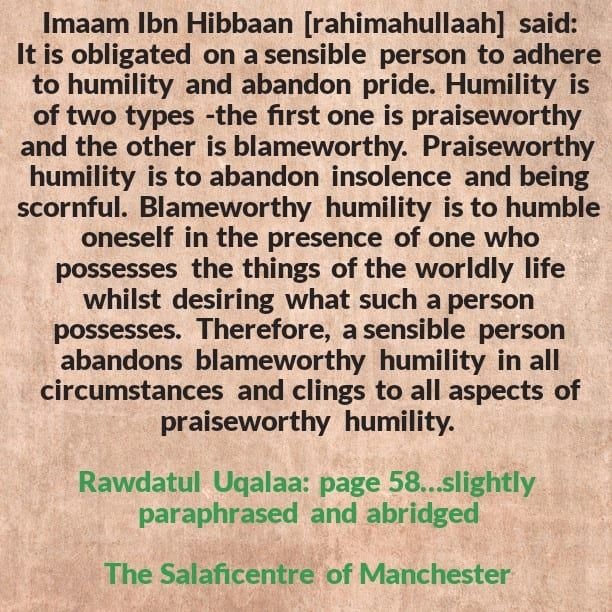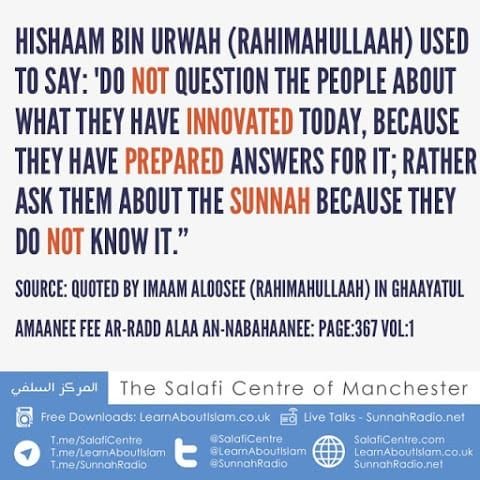[1] Salafi Scholars are clueless about current events that would strengthen the Ummah!
In The Name of Allah, The Most Merciful, The Bestower of Mercy.
A rebuke against those who say, “Salafi Scholars are clueless about current events that would strengthen the Ummah!”
Imam Abdul Azeez Bin Baaz [may Allah have mercy upon him] said:
There are numerous reasons for weakness, lack of advancement, and being overpowered by enemies. Many factors emanate from one (main) factor, and this one reason and factor is ignorance about Allah and the religion He has ordained, the final outcomes that have gripped the majority, and thus knowledge became limited and ignorance widespread. A number of issues resulted from this ignorance, including (blameworthy) love of the worldly life and dislike of death, neglect of (obligatory) prayers, following of (evil) desires, lack of preparation for the enemy, satisfaction in obtaining needs from the enemy, and a lack of high aspiration to meet needs from their country and resources. This ignorance also caused a lack of (sound) harmony, togetherness, and cooperation, which led to division and disagreement.
This demonstrates that the greatest cause of weakness is ignorance about Allah, ignorance about the religion ordained by Allah and those realities to which one is obligated to adhere and take into account, and that is the Prophet’s [peace and blessings of Allah be upon him] “If Allah wishes good for a person, He gives them understanding in religion.” This report, along with Qur’anic verses and other reports, demonstrates the filth of ignorance, its effects, and ultimate outcomes; rather, the Noble Qur’an is full of condemnation of ignorance and its people, as well as warnings against them, as Allah said:
وَلَكِنَّ أَكْثَرَهُمْ يَجْهَلُونَ
But most of them behave (ignorantly).
وَأَكْثَرُهُمْ لا يَعْقِلُونَ
And most of them have no understanding.
As well as other Qur’anic verses that dispraise ignorance, such as being ignorant of Allah and the religion He has decreed, being ignorant of the enemy, and that which is obligated (to Muslims) to prepare in terms of vigilance, (sound) unity, and cooperation.
And from this ignorance arose splitting, (blameworthy) differing, inclination towards (evil) desires, negligence towards prayer, neglecting what Allah has obligated, lack of giving precedence to the Afterlife and not truthfully associating oneself with it; rather, the majority is concerned only with this present worldly life, just as Allah said:
كَلا بَلْ تُحِبُّونَ الْعَاجِلَةَ
وَتَذَرُونَ الْآخِرَةَ
But (you men) love the present life of this world and leave (neglect) the Hereafter. [Surah Al-Qiyaamah. Verses 21-22]
And just as Allah [The Exalted] said:
فَأَمَّا مَنْ طَغَى
وَآثَرَ الْحَيَاةَ الدُّنْيَا
فَإِنَّ الْجَحِيمَ هِيَ الْمَأْوَى
Then, for him who transgressed all bounds and preferred the life of this world (by following his evil desires and lusts), verily, his abode will be Hellfire. [Surah An-Naazi’aat. Verses 37-39]
As a result, the Messenger’s statement, “If Allah wishes good for a person, He gives them understanding in the religion,” demonstrates that one of the signs of goodness and happiness for the individual, the people, and the state is they seek understanding in the religion, because seeking understanding in the religion, learning, and insight into what is obligated to them – now and in the future – is one of the most obligatory duties, and in this is a sign that Allah wishes good for them. And related to this is the fulfilment of what Allah has obligated, staying away from what Allah has made unlawful, and restricting oneself within the confines of Allah’s ordainments.
And among the detrimental causes (of weakness), their outcomes, and what they necessitate is that which has transpired in terms of weakness in the face of the enemy and being delayed in everything save what Allah wills to remain; inclination towards forbidden desires, preoccupation with what hinders the path of Allah and guidance, lack of preparation for the enemy in the arena of industry, lack of sufficient weaponry that frightens the enemy- to help fight him, strive against him in Jihad, taking one’s rights from him, not preparing the bodies for jihad and not spending money in what is obligatory to prepare for the enemy, guard against his evil, defend the religion and the homeland. Except for what Allah wills, the preparation is poor or non-existent, and the goals are skewed. Thus, the path of success, the path of advancement over adversaries and the absence of weakness in front of them, the path of prosperity and success, the way to gaining high status and the lofty goals to be sought after, triumph over enemies- the path to all of this is to embrace beneficial knowledge and the sound understanding of the religion, give priority to Allah’s pleasure over His displeasure, pay close attention to what Allah has obligated, abandon what Allah has made unlawful, and repent truthfully to Allah from one’s sins and shortcomings.
Also, in Muslim countries, there should be industries, preparation, and strength that will enable every individual through every means, so that one has no need of the enemy – until the enemy knows what this Muslim has of preparation and talent, and the enemy is afraid of him, treats him fairly and fulfils his rights. The bodies must be prepared and should resist overindulging in that type of luxury that will weaken the strength and the hearts when required to battle the enemy, and so that one has the strength to execute Jihad. The state and the people should cooperate fully on what is necessary of obedience to Allah and His Messenger, refraining from what Allah [The Mighty and Majestic] have forbidden, and collaborating on what is required to make preparations, as Allah said:
وَأَعِدُّوا لَهُمْ مَا اسْتَطَعْتُمْ مِنْ قُوَّةٍ
And make ready against them all you can of power.
[Surah Al-Anfaal. Verse 60]
It is necessary to physically prepare- prepare equipment (of defence and war), and other types of equipment in all aspects so that we can suffice with what Allah [Glorified be He] has given us and not be in need of what our enemies possess because fighting our enemies with what they possess is extremely difficult to obtain. If the enemy prevents you from acquiring weapons, what do you fight with in addition to a lack of awareness and knowledge?! It is necessary to prepare what is possible, and whatever is attainable is sufficient as long as Muslims intend to do without their enemy, fight their enemy, save their country, establish Allah’s command in the land, and have the intention (to receive a reward) in the Afterlife to the greatest extent possible because Allah [Glorified and Exalted be He] says: [وَأَعِدُّوا لَهُمْ مَا اسْتَطَعْتُمْ مِنْ قُوَّةٍ – And make ready against them all you can of power], but Allah did not say, “And make ready against them that which is equal to their power” since that may not be achievable.
If the Muslims are sincere, join hands, prepare for their enemy with as much equipment as they can, and defend the religion ordained by Allah, then Allah [Glorified and Exalted be He] will help them and place them in front and above the enemy, rather than under the enemy. Allah- the One Who is truthful in His speech and promises – said:
يَا أَيُّهَا الَّذِينَ آمَنُوا إِنْ تَنْصُرُوا اللَّهَ يَنْصُرْكُمْ وَيُثَبِّتْ أَقْدَامَكُمْ
O you who believe! If you help (in the cause of) Allah, He will help you, and make your foothold firm.
Allah is neither unable nor in need of the people, but He puts His good servants to the test through the evil ones, so that the truthfulness of the truthful ones can be distinguished from the lies of the liars, the one who truly strives in the path of Allah can be distinguished from others, and the one desirous of safety (in this life and the next) can be distinguished. This is the reason, otherwise, Allah is able to aid His allies and destroy His adversaries without the need for Jihad, preparations, and other things, as He [Glorified be He] said:
ذَلِكَ وَلَوْ يَشَاءُ اللَّهُ لانْتَصَرَ مِنْهُمْ وَلَكِنْ لِيَبْلُوَ بَعْضَكُمْ بِبَعْضٍ –
But if it had been Allah’s Will, He Himself could certainly have punished them (without you). But (He lets you fight), in order to test you, some with others]. [Surah Muhammad. Aayah 4] (1) [End of quote]
Finally, the preparation of weapons is the task of Muslim governments, not insurgent organisations. The Khawaarij (ISIS and their ilk) have no authority; instead, they are bandits, innovators in religious affairs, and terrorists. Upright Muslims obey their rulers in good, fulfil the agreements their rulers have established between their nations and other nations, and uphold upright conduct whether in their home countries or abroad. Must-read articles by Shaikh Abu Khadeejah and Shaikh Abu Iyaad [may Allah protect them].
The Protection of the Blood, Wealth, and Honour of Non-Muslim Citizens in the Islamic Shariah
http://www.shariah.ws/articles/xzxcfnc-the-great-value-in-the-islamic-shariah-for-the-protection.cfm
Al-Allaamah Salih Aal Ash-Shaikh: Shariah Calls for Protection of Life and Property
http://www.shariah.ws/articles/csuslgk-shaikh-salih-aal-ash-shaikh-shariah-calls-for-protection-of-life-and-property.cfm
Al-Allaamah Salih Al-Fawzan: The Islamic Shariah Provides Security for Muslims and Non-Muslims and Those Who Violate It Are Kharijites Who Are to Be Fought and Severely Punished
http://www.shariah.ws/articles/duviqgl-shaykh-salih-al-fawzan-the-islamic-shariah-provides-security–for-muslims-and-non-muslims-and-those-who-violate-it-are-kh257rijites-who-are-to-be-fought-and-severely-punished.cfm
The Islamic Shariah on the Foundation of Muslim Relations With Non-Muslims Who Do Not Show Aggression and Hostility
http://www.shariah.ws/articles/szsumlh-the-foundation-of-muslim-relations-with-non-muslims-who-do-not-show-aggression-and-hostility.cfm
Islam and the Muslims Are Free and Innocent of the Kharijite Extremists and the Islamic Shariah Has Come With a Command to Fight Them
http://www.shariah.ws/articles/nmsdfkp-islam-and-the-muslims-are-free-and-innocent-of-the-kharijite-extremists.cfm
Al-Allaamah Saleh Fawzaan on Jihaad in our times and the guidelines of Jihaad according to Islam – Abu Khadeejah : أبو خديجة
https://www.abukhadeejah.com/salafi-shaikh-fawzaan-on-jihaad-in-our-times-and-the-guidelines-of-jihaad-according-to-islam/
The Prophet of Islam would not kill diplomats, ambassadors, emissaries or foreign delegations even if they were sent by the worst of his enemies
https://www.abukhadeejah.com/the-prophet-of-islam-would-not-kill-diplomats-ambassadors-emissaries-or-foreign-delegations-even-if-they-were-sent-by-the-worst-of-his-enemies/
Ref1:paraphrased: https://binbaz.org.sa/discussions/42/%D8%A7%D8%B3%D8%A8%D8%A7%D8%A8-%D8%B6%D8%B9%D9%81-%D8%A7%D9%84%D9%85%D8%B3%D9%84%D9%85%D9%8A%D9%86-%D8%A7%D9%85%D8%A7%D9%85-%D8%B9%D8%AF%D9%88%D9%87%D9%85-%D9%88%D9%88%D8%B3%D8%A7%D9%89%D9%84-%D8%A7%D9%84%D8%B9%D9%84%D8%A7%D8%AC ]










